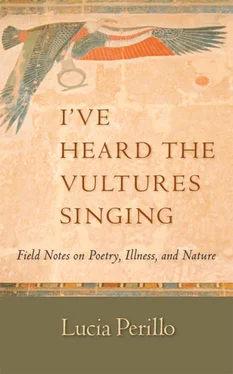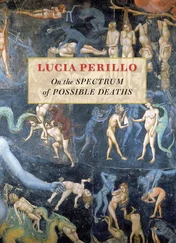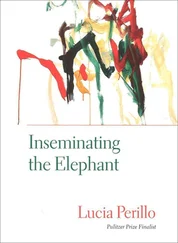“The Robin’s my Criterion for Tune— / Because I grow — where Robins do— / But, were I Cuckoo born— / I’d swear by him—” Dickinson wrote, explicitly stating her satisfaction with using whatever nature is at hand. It takes courage to spend time considering nature when your life is circumscribed, because this means considering what you have lost.
Dickinson’s most famous bird poem was written in 1861, during a five-year period of feverish production. It opens:
“Hope” is the thing with feathers—
That perches in the soul—
And sings the tune without the words—
And never stops — at all—
Because I’d learned this poem’s first line out of context, I took it to mean that birds in general were hopeful things. But when you see the whole poem you understand it’s the other way around: the idea of “Hope” is being made into a bird. (And why the quotes? Is it because Hope is being used as shorthand for a more complicated psychic brew, the way people will hold up two fingers of each hand like hooks to scratch the air, a gesture that is supposed to encapsulate an idea already circulating in the culture at large?)
When I worked as a naturalist on San Francisco Bay, birds freaked me out a little. What I found frightening was the degree to which the plumage functions as a cloak that keeps you from seeing the bird as it really is. You’d see the gull with its thick hide shining and think it was a perfect, sturdy thing. But then a dead gull would turn up in one of the salt ponds that comprised the refuge. And you’d realize that, underneath the feathers, a bird is little more than a skeleton with a beating heart inside. Their beauty is an artifact, created by their constant preening. They spend the bulk of their hours on what could seem like narcissistic self-concern because grooming keeps them from freezing or drowning or getting parasitized or eaten.
A different poet foolishly equated beauty with truth, but in the case of gulls beauty equals survival.
Field Note from 11/29
I’m leapfrogging a pair of young men at the lake in the center of town, advancing past them and being advanced when I stop to look through my binoculars. Lots of ducks, but the gulls too far out to see. I see a beaver noodling around just a few yards from my feet, and when the men advance toward me I whisper: Look.
(Such self-importance attached to being the one who spots the animal, to being the one who wins the contest of perception. I’m a little embarrassed when I find myself playing this game.)
These men, I realize, are an autistic man and his caregiver walking on a sunny day. The caregiver points his caregiven toward the beaver, but the autistic man, in his blue windbreaker, keeps turning to look at me. On my cart, with its basket full of books and pens, I’m more interesting to him than any wild creature. Or maybe I am a wild creature — this idea appeals to me.
Only it turns out that I am wrong about this beaver, who is in fact a nutria, a South American rodent introduced for its fur, thirteen of them imported to Louisiana by the hot sauce baron McIlhenny in 1937. Now they’ve chewed their way to the Northwest—“eat outs” are what you call areas of infestation where the marsh grasses are completely grazed. The state of Louisiana is trying to solve the problem by popularizing them as a recipe ingredient. Most of the recipes call for hot sauce, I note.
Invasive swamp rat, destroyer of wetlands, a trash animal like the gull. How quickly the mind swivels in response to what it learns.
Dickinson equated birds with time’s passage because they migrate. Their recurrences are a reminder that another year has passed, that death has taken a step closer.
I dreaded that first Robin, so,
But He is mastered, now,
I’m some accustomed to Him grown
He hurts a little, though—
And because they leave, she sees them also as the embodiments of grief:
’Tis not that Dying hurts us so—
‘Tis Living — hurts us more—
But Dying — is a different way—
A Kind behind the Door—
The Southern Custom — of the Bird—
That ere the Frosts are due—
Accepts a better Latitude—
We — are the Birds — that stay.
Staying is hard, the staying is work, because of the sorrow that comes from being abandoned by the dead. Migration became a code, a shorthand for the way that many of her friends died while Dickinson kept on living.
Gulls do not abandon us, though — they always seem to be loitering in our midst. Not that death doesn’t come as a parcel with their company: you can’t stare for too long at the water’s edge before some part of a dead gull comes washing up, the primary feathers ragged around the translucent spike of the white shaft. There’s something terrible about it — because the living bird looks so pristine — and one’s first impulse is to turn away from the sodden feather barbs, turned into scraggly threads. How not to be repulsed by the wet gray meat of the breast?
But I’m trying to teach myself not to be squeamish when it comes to looking, looking being one thing I can still do. This is how my life is shaped these days, by process of elimination: I do what I can still do. Somehow it’s always interesting, at least so far.
Field Note from 12/3
A pair of hooded mergansers is dabbling at something below the surface, and the gulls keep swooping, trying to drive them off. As soon as the ducks find another spot to dabble, the gulls want it too — and so they move around the bay off Costa del Bum like checkers.
The male hooded merganser is my favorite bird, what with its spectacular freakish head, which looks like nothing special until the crest that slumps off the back of the head lifts up and spreads out like a fan. The male’s head is black, with a white patch that widens behind his eye when the crest is raised.
A jogger approaches, then holds up, running in place so he can ask what I’m looking at. “Oh, just gulls,” I say. It’s not even worth attempting to feel self-important when squaring off against a guy who’s wearing Lycra tights. He wins — he’s the superior being. Defeated, I shrivel up and will not speak.
I was married off the coast of Costa del Bum, on an old wooden boat called The Lotus. At the little ceremony, which seems so ridiculous in retrospect, we quoted Archibald Mac-Leish: “We say that Amor vincit omnia but in truth love conquers nothing — certainly not death — certainly not chance. What love does is to arm. It arms the worth of life in spite of life.” This is a gull kind of statement — that life is brutal, that you have to approach it with suspicion and a sharp hooked beak. Archibald MacLeish is long dead and maybe not held in anyone’s esteem as a poet anymore, but the quote is one thing I retain from the wedding ceremony that I’m not embarrassed about, because it turned out to suit my life so well.
Jim remembers sweeping the dock to get rid of the bird shit and the broken shells that the gulls had dropped, and so the first picture that I painted, of the gulls as trash-eaters, was incomplete. Of course they eat mollusks, and they also eat chicks that stray — my old ornithology textbook says this cannibalization accounts for as much as 70 percent of the mortality of their young. If I were a gull, my neighbors would have already finished me off.
“But you are not a gull,” Jim reminds me. That old admonishment again.
Phone Machine, 1/11
Gordon, the Audubon volunteer, leaves a message in response to my inquiry. He gives me web addresses where I can find the bird checklist from the nearby wildlife refuge, as well as the tally from last year’s Christmas Bird Count. It turns out I’ve been completely wrong: there are no herring gulls on the bird count, and the wildlife refuge lists them as only a rare visitor here in winter.
Читать дальше











![Various - Birds and Nature, Vol. 12 No. 5 [December 1902]](/books/745517/various-birds-and-nature-vol-12-no-5-december-thumb.webp)
![Various - Birds and Nature Vol. 11 No. 2 [February 1902]](/books/745533/various-birds-and-nature-vol-11-no-2-february-1-thumb.webp)